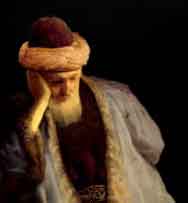Abū-Sa'īd Abul-Khayr
Abu Sa'id Abu'l Khair -i (* 978 in Mayhana, Khorasan; † ibid 1049 or 1061 ) was a Persian Sufi ( Islamic mystic ). He was instrumental in the development of the Sufi tradition.
Life
Abu Sa'id's father was a doctor, who ran herbal medicine, concerned with mysticism and Sufism.
First, he studied with the teachings of Islam and Arab literature. At the age of 23 years, however, Sufism took over the lead role in his life. He was one of the first Sufiautoren who used simple love poems to explain mysticism. He was one of the first representatives of the Persian Sufidichtung. His fame stretched out already during his lifetime over the entire Islamic world. However, it is believed today that many of the poems which are attributed to him, did not come from him. One thinks that this erroneous attributions come from his love of poetry, which he quoted in his daily prayers. Even his last words are said to have a poem and instead of Koran verses to a poem at his funeral have been recited.
Abu Sa'id was a pupil of the famous Sufis al - Sulami (936-1021) and is considered the first representative of Sufism, who set up a kind of monastic rule for his students. It is reported that he practiced for seven years extremely ascetic exercises and entirely devoted to the word of Allah.
For his life he was admired and appreciated by the people first. He used mainly self-abasement in the service of his brothers and presented also a great zeal for the ritual washing of the day. He was later rejected mainly because of its direct nature and reveling in the dhikr of the scholars and theologians of his time. This even led to a series of assassinations against Abu Sa'id, but all were unsuccessful.
At the age of 40 years, according to tradition, he reached enlightenment. From that moment on he gave to the earlier ascetic way of life. From now on, he used the financial support that was given to him by pious Muslims, to entertain his brothers and friends.
The place Mayhana was at that time one of the most important cities of Khorasan, but today is used by it only the tomb of Abu Sa'id and the building in which it is located, remained. For most of his life he spent in the Persian city of Nishapur, which was regarded as one of the greatest cities in the world.
Most of the information about him and his life taken from the book Asrar al - Tawhid fi Maghamat (Arabic: اسرار التوحید فی مقامات ابو سعید ), by one of his grandson, Mohammad Ibn Monavvar, about 130 years after his death written. The book tells is a collection of anecdotes about his life and contains a collection of his lyrics. It is one of the most important works of early Sufism.


.jpg/300px-Ab%2525C5%2525AB-Sa%2527%2525C4%2525ABd_Abul-Khayr_Statue_at_nishapur_(5).jpg)


.jpg)
.jpg/768px-Ab%2525C5%2525AB-Sa%2527%2525C4%2525ABd_Abul-Khayr_Statue_at_nishapur_(2).jpg)

.jpg)
.jpg)
